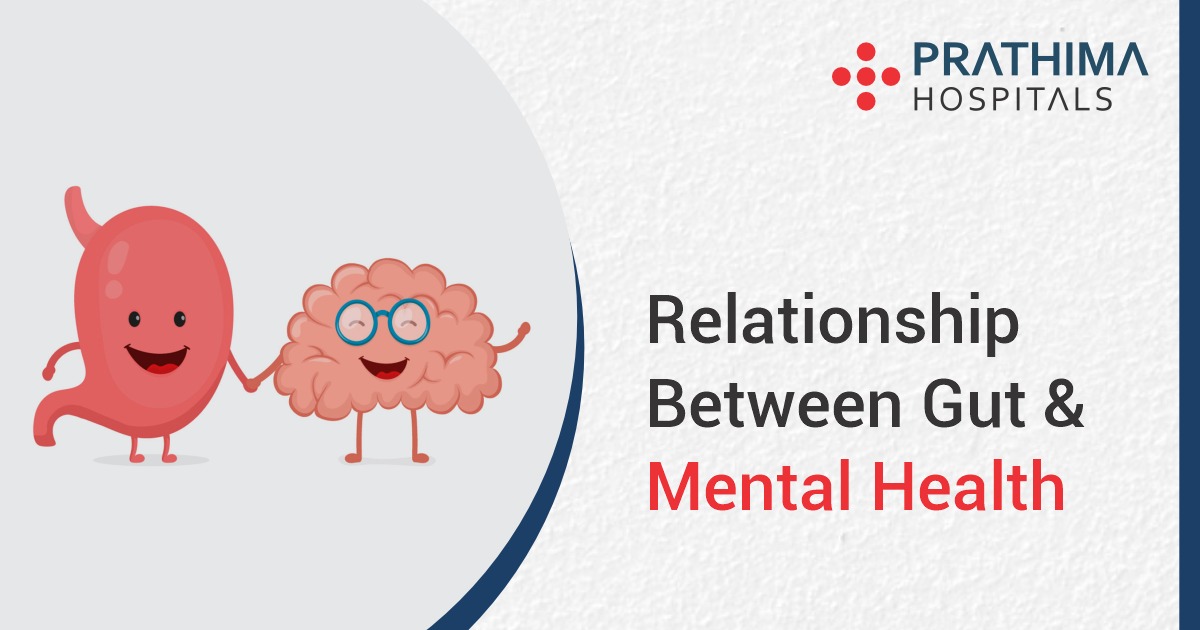How Does The Gut Affect Mental Health?

Gut and Mental Health Relation
Introduction:
There is a fascinating relationship between gut health and mental health uncovered by scientific research in recent years. As said by the Best Gastroenterologist in Hyderabad gut, often referred to as the “second brain,” houses trillions of microorganisms that play a crucial role in various bodily functions, including digestion, immune system regulation, and the synthesis of essential vitamins. However, emerging evidence suggests that the gut microbiota also influences our mental well-being, impacting mood, cognition, and even the development of mental disorders. This article delves into the intricate connection between gut health and mental health, shedding light on the bidirectional communication pathway known as the gut-brain axis.
1. The Gut Microbiota:An Ecological Community:
The human gut harbours a vast ecosystem of microorganisms, collectively known as the gut microbiota. This diverse community comprises bacteria, viruses, fungi, and other microbes, which coexist in a delicate balance. The composition and diversity of the gut microbiota can be influenced by various factors, such as diet, lifestyle, stress, and medication. Perturbations in the gut microbial ecosystem, termed dysbiosis, have been associated with several mental health conditions, including depression, anxiety disorders, and even neurodevelopmental disorders like autism.
2. The Gut-Brain Axis: Bridging the Gap:
The gut-brain axis is a complex bidirectional communication network that connects the gastrointestinal tract (GI) and the central nervous system (CNS), encompassing various components such as the gut microbiota, the enteric nerve system, the autonomic nervous system, and the central nervous system. This intricate system allows for constant communication and interaction between the gut and the brain, influencing physiological processes, immune responses, and mental health.
Gut Microbiota: The gut microbiota, a vast ecosystem of microorganisms residing in the GI tract, plays a fundamental role in gut-brain axis communication. It consists of trillions of bacteria, viruses, fungi, and other microbes, collectively referred to as the gut microbiome. The composition and diversity of the gut microbiota are influenced by numerous factors, including diet, lifestyle, medication use, stress, and early-life experiences.
Enteric Nervous System (ENS): The ENS, often referred to as the “second brain,” is a complex network of neurons lining the walls of the GI tract. It can function autonomously and independently from the CNS but also communicates with the brain. The ENS controls various GI functions, including motility, secretion, and nutrient absorption. It sends signals to the CNS via the vagus nerve, which serves as a major pathway of communication in the gut-brain axis.
Autonomic Nervous System (ANS): The ANS is responsible for regulating involuntary bodily functions, including those of the GI tract. It consists of 2 branches: the sympathetic nervous system (SNS) and the parasympathetic nervous system (PNS). Fight-or-flight is the function of the SNS, whereas rest-and-digest is the function of the PNS. The ANS modulates gut motility, blood flow, and secretion, and it plays a crucial role in the bidirectional communication between the gut and the brain.
Central Nervous System (CNS): The CNS, which includes the brain and spinal cord, receives and processes signals from the gut. It plays a vital role in regulating behaviour, emotions, cognition, and overall mental health. The CNS can influence the gut through efferent pathways, sending signals to modulate gut motility, secretion, and immune responses. Additionally, the CNS receives afferent signals from the gut, providing information about gut conditions, immune activity, and gut microbiota composition.
Signalling Pathways: The gut-brain axis communicates through various signalling pathways, including neural, hormonal, and immune pathways.
Neural Pathways: The vagus nerve, a long cranial nerve, serves as a major pathway of communication between the gut and the brain. It transmits signals bidirectionally, carrying information about gut conditions, nutrient availability, and the gut microbiota to the CNS, and receiving signals from the CNS to modulate gut functions.
Hormonal Pathways: The gut produces and releases a variety of hormones, such as ghrelin, leptin, and peptide YY, that regulate appetite, satiety, and metabolism. These hormones can also influence mood and cognitive function. Gut hormones can act directly on the CNS or indirectly by modulating neurotransmitter pathways.
Immune Pathways: The gut is a vital component of the immune system, and gut immune cells communicate with immune cells in the brain. Inflammation in the gut, often associated with dysbiosis and increased gut permeability, can trigger an immune response and lead to systemic inflammation. This chronic inflammation can impact brain function and contribute to the development of mental health disorders.
Influence on Mental Health: According to the Best Gastroenterologist in Kukatpally the gut-brain axis has a profound impact on mental health and plays a role in the development, progression, and management of various mental health disorders, including depression, anxiety, stress-related disorders, and neurodevelopmental disorders.
Neurotransmitter Production: The gut microbiota influences the production and availability of neurotransmitters, such as serotonin, dopamine, and GABA, which are crucial for regulating mood, cognition, and behaviour. Imbalances in these neurotransmitters have been implicated in mental health disorders.
Stress Response: Stress can significantly impact gut health and gut microbiota composition. Stress hormones, such as cortisol, can influence the gut microbiota and gut barrier function. Conversely, the gut microbiota can modulate the stress response by producing neurotransmitters and metabolites that affect the HPA axis (hypothalamic-pituitary-adrenal axis), which regulates the stress response.
Gut Permeability and Inflammation: Dysbiosis and increased gut permeability can lead to the translocation of harmful substances, such as bacteria and toxins, from the gut into the bloodstream. This triggers an immune response and systemic inflammation, which has been linked to mental health disorders. Inflammation can affect neurotransmitter synthesis, neuroplasticity, and neural circuitry in the brain.
3.Gut Microbiota and Neurotransmitter Production:
Neurotransmitters, chemical messengers in the brain, play a vital role in regulating mood, cognition, and behaviour. Surprisingly, a significant proportion of neurotransmitters, including serotonin, dopamine, and gamma-aminobutyric acid (GABA), are produced in the gut. The gut microbiota influences the synthesis and availability of these neurotransmitters through various mechanisms, such as modulating precursor availability, producing neurotransmitter metabolites, and regulating the expression of neurotransmitter receptors. Imbalances in these neurotransmitters have been implicated in mental health disorders, and the gut microbiota’s role in their regulation highlights its impact on mental well-being.
4.Gut Permeability and Inflammation:
Intestinal permeability, commonly referred to as “leaky gut,” refers to an abnormal increase in the permeability of the intestinal lining. When the intestinal barrier is compromised, it allows the passage of harmful substances, such as toxins and bacteria, into the bloodstream. Chronic inflammation results from this immune response. Emerging evidence suggests that increased intestinal permeability and inflammation may contribute to the development of psychiatric conditions, including depression and anxiety as per the Best Gastroenterologist in Kachiguda. The gut microbiota plays a critical role in maintaining the integrity of the intestinal barrier, and dysbiosis can disrupt this balance, contributing to gut permeability and inflammation.
5. The Role of the Gut Microbiota in Stress Response:
Stress, whether acute or chronic, has a significant impact on mental health. The gut microbiota plays a pivotal role in stress response regulation. Studies have demonstrated that stress can alter the composition of the gut microbiota, favouring the growth of potentially harmful bacteria. These changes in the gut microbiota can, in turn, influence stress sensitivity and the body’s response to stress through the production of stress hormones and the modulation of neurotransmitter pathways. Understanding this intricate interplay between gut microbiota and stress response is crucial for unravelling the connection between gut health and mental well-being.
6. Implications for Mental Health Disorders:
The intricate link between gut health and mental health has implications for the prevention and treatment of various mental health disorders. Research in animal models and humans has shown promising results in using probiotics, prebiotics, and dietary interventions to modulate gut microbiota and improve mental health outcomes. Additionally, targeting the gut microbiota through interventions like faecal microbiota transplantation (FMT) holds potential as a novel therapeutic avenue. However, further research is needed to fully understand the complexity of the gut-brain axis and develop effective treatments.
Conclusion:
According to the Best Gastroenterologist in KPHB, the emerging field of research exploring the connection between gut health and mental health highlights the remarkable interdependence of our bodily systems. The gut microbiota influences neurotransmitter production, immune responses, stress regulation, and gut permeability, all of which have significant implications for mental well-being. Recognizing and harnessing the power of the gut-brain axis may pave the way for innovative interventions and personalized approaches in mental health care. Further exploration and understanding of this intricate connection hold the promise of improved outcomes for individuals with mental health disorders and a deeper appreciation of the profound interplay between our gut and mind.
.
.
.
.
.
For more details:
📞:: 733 733 6600 | 040 4345 4345
🌐:: https://prathimahospitals.com/book-appointment/






Warning: Undefined variable $req in /home/u885608126/domains/prathimahospitals.com/public_html/wp-content/themes/prathimahospitals/functions.php on line 294
Warning: Undefined variable $commenter in /home/u885608126/domains/prathimahospitals.com/public_html/wp-content/themes/prathimahospitals/functions.php on line 295
Warning: Trying to access array offset on value of type null in /home/u885608126/domains/prathimahospitals.com/public_html/wp-content/themes/prathimahospitals/functions.php on line 295
Warning: Undefined variable $aria_req in /home/u885608126/domains/prathimahospitals.com/public_html/wp-content/themes/prathimahospitals/functions.php on line 295
Warning: Undefined variable $req in /home/u885608126/domains/prathimahospitals.com/public_html/wp-content/themes/prathimahospitals/functions.php on line 298
Warning: Undefined variable $commenter in /home/u885608126/domains/prathimahospitals.com/public_html/wp-content/themes/prathimahospitals/functions.php on line 299
Warning: Trying to access array offset on value of type null in /home/u885608126/domains/prathimahospitals.com/public_html/wp-content/themes/prathimahospitals/functions.php on line 299
Warning: Undefined variable $aria_req in /home/u885608126/domains/prathimahospitals.com/public_html/wp-content/themes/prathimahospitals/functions.php on line 300
Warning: Undefined variable $commenter in /home/u885608126/domains/prathimahospitals.com/public_html/wp-content/themes/prathimahospitals/functions.php on line 303
Warning: Trying to access array offset on value of type null in /home/u885608126/domains/prathimahospitals.com/public_html/wp-content/themes/prathimahospitals/functions.php on line 303